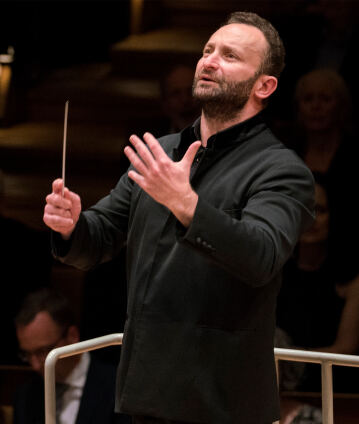Kirill Petrenko conducts Stravinsky, Zimmermann and Rachmaninov

The music of the 20th century is often considered inaccessible. Kirill Petrenko shows how wrong this prejudice is with three works written between 1940 and 1950 which differently convey sensuousness and energy. We experience rhythmic power in Stravinsky’s Symphony in Three Movements, the combination of innovation and Brazilian flair in Zimmermann’s Alagoana and finally, the voluptuous melancholy of Rachmaninov’s Symphonic Dances.
In these four concerts, the Berliner Philharmoniker, conducted by their new chief conductor Kirill Petrenko, present three compositional masterworks, all of which were composed during the decade between 1940 and 1950 and explore entirely different avenues of musical modernism but are not based on Arnold Schoenberg’s twelve-tone technique.
Igor Stravinsky’s Symphony in Three Movements was written in 1945, shortly after the composer had taken American citizenship, on a commission from the Philharmonic Society of New York and premiered by the New York Philharmonic under Stravinsky in January 1946. In a programme note written for the premiere, Stravinsky commented that the work, which recalls the composer’s neoclassical phase because of its transparent texture, “has no program, nor is it a specific expression of any given occasion; it would be futile to seek these in my work. But during the process of creation in this, our arduous time of sharp and shifting events, of despair and hope, of continual torments, of tension and, at last, cessation and relief, it may be that all those repercussions have left traces in this Symphony.”
Five years later, Bernd Alois Zimmermann drew inspiration from South American myths and Brazilian music for the five-movement ballet music Alagoana – not for the purpose of folkloric appropriation, but in order to expand his compositional repertoire of rhythms, melodic ideas and orchestral timbres with new elements. The expressive score, which had its premiere in Essen in 1955 after revision by the composer, is reminiscent of scandalous compositions of the 1910s and 1920s, such as Maurice Ravel’s Boléro and Stravinsky’s The Rite of Spring, but nevertheless reflects Zimmermann’s own musical style.
Sergei Rachmaninov’s Symphonic Dances – also composed in the US, in 1940, and premiered the following year by the Philadelphia Orchestra under Eugene Ormandy – was the composer’s last work. On the one hand, it is a nostalgic farewell to the irrevocably ended era of musical late Romanticism, but thanks to its sophisticated use of formal rigour and lyrical, expressive tone, it would prove to be groundbreaking for the aesthetic sensibility of those composers of the following generation who did not submit to the dictates of an unquestioning belief in compositional progress.
© 2020 Berlin Phil Media GmbH
Related interviews
Artists
Our recommendations
- Kirill Petrenko and Daniil Trifonov
- 2022 New Year’s Eve Concert with Kirill Petrenko and Jonas Kaufmann
- Kirill Petrenko conducts Smetana’s “Má vlast”
- 2023 New Year’s Eve Concert with Kirill Petrenko and Jonas Kaufmann
- Kirill Petrenko conducts Mendelssohn and Shostakovich
- Kirill Petrenko and Lisa Batiashvili